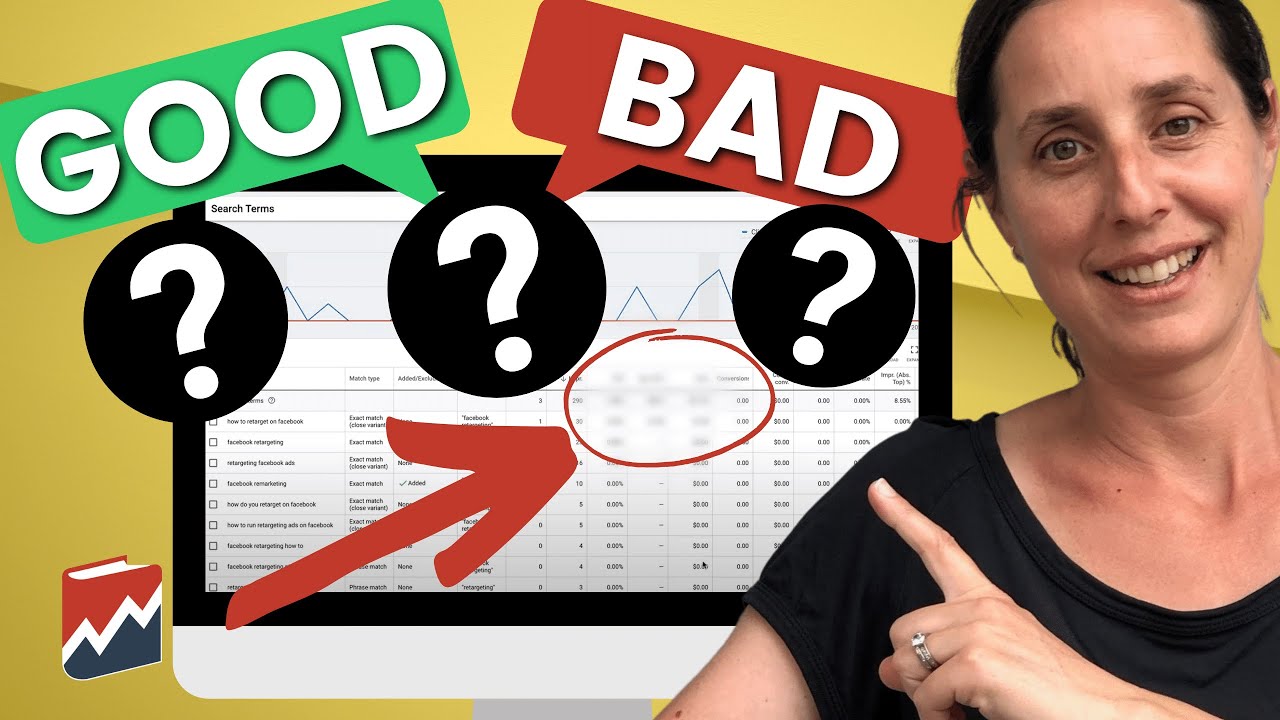In Advertising
How to Optimize Google Ads Search Campaign the Right Way - read the full article about Google Ads tricks, Advertising and Paid online promotion from MeasureSchool on Qualified.One

Youtube Blogger

- Ilana here from teachtraffic.com recording a video for measureschool.com.
And in todays video, Im gonna walk you through the five steps that you need to take to optimize your Google Search campaign.
Im gonna walk you through a live Google Ad account and show you each of these steps that you need to look for in your account to hopefully improve your results even further.
So lets head on over to the account and well get stuck right in.
Okay, here we are in a live Google Ad account.
Were looking at about a 30 day period.
So October 14 to November 17.
And as you can see here, weve got clicks versus conversions.
And conversions are sales, okay? So the number one metric that youre gonna be looking at when you manage your account, its the metric that you live and breathe by, is really your cost per conversion, or your cost per sale, or whatever it is the conversion that you are tracking, okay? How much did you pay to acquire that lead or sale? And in this instance, it is a sale sending people to a retargeting challenge.
So I need to weigh up that my cost per lead of $80, basically here, and how I can take steps to reduce that cost per conversion and hopefully improve my conversion rate.
And so this video is really gonna walk you through that.
So the first step is to really have a look at your cost per conversion and determine if that is at a threshold that youre happy with.
If its at a threshold that you are happy with, then it makes sense to really perhaps increase your budget and really try and ramp up spend, okay? But really if its not, were always looking to try and improve, then step two is to really look at whats called your search term report.
So if I go into this campaign, its obviously a Search campaign, and lets say I go into one of the particular ad groups.
Theres a discrepancy between the keyword that youre bidding on and what somebody actually typed into Google, which is the search term.
And as you can see here, weve got search terms.
So this is what somebody actually typed into Google where my ad was triggered and possibly even clicked on it.
So my search keyword here is Im bidding on Facebook retargeting, or just retargeting on its own, Facebook remarketing, et cetera.
And the search term is somewhat different.
So 30 people have typed in how to retarget on Facebook of which one person clicked on the ad.
So really my job here is to have a look through these terms to decide which terms I do not want to show up for in future.
So for example here, retargeting solutions, that must be a business name or something.
I dont actually know what that is.
So lets say I wanna add solutions as a negative keyword because thats not really applicable.
So Ill just copy this and Im gonna go negative keywords, and Im gonna go plus, and I know this is right way of adding a negative keyword.
I wanna add it actually at a campaign level.
So I want this negative keyword to apply to all the ad groups in this campaign.
And Im just gonna copy in solutions like this.
Im not gonna put any kind of syntax around this word.
I just want any instance of the word solutions to be prevented from showing up.
And I click save, and then we go back to search terms.
Its gonna refresh that page.
And then what youll be able to see is then it will hopefully be excluded from future ones.
So really my job here is to look through here to see which are other possible negative keywords.
So fbx would be another one as well.
And so you can download this into Excel, thats often what we do.
We download this report, we make a short list of all the possible negative keywords.
And then we just go to negative keywords and add them this way, okay? So that is what you need to do with this, the first thing you need to the search term report.
The other thing you need to do is you need to really look through them to see if theres any other keywords that you might wanna add.
So possibly if I might wanna add Facebook retargeting pixel as a possible keyword, maybe in its own ad group, and then write an ad that talks about, that weve got training on how to install the pixel and where to find the pixel code, et cetera, which we do cover, okay? So your job is really to match the term with the ad that youre showing someone and where youre sending them to, okay? So theres really, as I said, twofold, adding negatives and adding possible keywords, all right? The other thing that you might wanna have a look at is your ads, okay? So look at your click through rate to see if you could possibly improve the click through rate at all.
And this also is an extension, even though this is strategy number three, because youre really having a look at your search term report to see should you change your headlines to really kind of get in the mind of the moment that somebody is in on Google, okay? So here we talk about pixel retargeting tutorials, and obviously this ad does not get as good a click through rate as this one.
So we might look to pause this ad, create another ad for another possible split test and write some different headlines, okay? So that is strategy number three.
The fourth thing that I want you to look at is quality score.
That is a big factor to the success of your campaigns.
So if we go into this other ad group, youll see that some of my keywords here have whats called a low quality score.
If youre not sure what quality score is, this three factors that comprise quality score, the first is click-through rate, the second is relevant score, and the third is landing page experience.
And if you have a low quality score, basically youre going to pay more for a cost per click.
If you have a really good quality score, then you will pay less for the cost per click.
So I guess Google is not really a traditional auction in the sense that the person whos willing to bid the highest gets the number one ad spot, quality score really has a big effect on how much you pay per click as well as where you are in the ad pack, okay? So generally speaking, the way we improve quality score is by stripping these keywords out from this ad group and put them in their own campaign, in their own ad group and write an ad that really talks directly to that particular keyword, okay? And sometimes Ive had instances where even doing that hasnt really helped it, for whatever reason Google doesnt like it.
So possibly we change ads to improve our click through rate and ad relevance, run a compelling ad that will hopefully improve our click through quality score, okay? So thats the fourth thing that you need to look at.
And finally, the last step that you need to look at is your keywords that might be below first page bid as you can see here, below first page bid.
So here are bidding 60 cents for this single keyword, which I normally wouldnt do.
I just did for training purposes.
And Googles telling me in order for my ad to be on the first page, I have to bid at least a $1.66.
for this one $4.27.
So you can see these different keywords have different bids, okay? So you need to decide if you wanna bid at that certain level in order to be on the first page.
And as you can see here, Facebook retargeting, one keyword is $11.54.
Its a crazy prices.
So you wanna look for keywords that are below first page bid and possibly consider doing Googles automated bidding.
And as you can see, Ive sort of navigated to the topic, cause I wanna show you heres where we were doing manual bidding, where we were below first page bid.
The strategy here was intentionally to bid low.
So we could find the negative keywords to add so that we dont waste money on bidding top dollar for keywords.
Once we find our negative keywords, actually we switched to Googles automated bidding.
So as you can see here, Ill put a note here, a switch to maximize conversions.
And as you can see then, our clicks increased and we started to get some sales.
So a transformation in this account, okay? So Googles automated bidding is where you dont bid on a cost per click, Google does all the bidding for you.
So I did a bid strategy called maximize conversions.
The idea of doing that temporarily to then transfer it into target CPA bidding, okay? So Im gonna show you how to do that last, really quick, go into the campaign, go into settings.
And were gonna change this at a campaign level.
We go into bidding, change bid strategy, and then we want to do maximize conversions.
If you wanna set a target cost per acquisition, kinda going back to strategy one of really managing your account as per cost per conversion, you could do that.
So lets say I wanna set a target cost per acquisition of $50, but you run the risk of maybe Google not giving you impressions and youre not getting clicks.
So starting out with, I like to do maximize conversions to get some data under the belt and then look to try and reduce the cost per conversion that way, okay? So Im gonna click save.
And then if we go into one of the ad groups, youll see here that Ive got no ability to change the bid because Google is going to be doing the bids for me.
And it said, see, bid strategy type is maximize conversions.
So they have it, five steps that you need to look for in order to improve the results of your Search campaign.
I really hope you enjoyed this video and stay tuned for future videos.
- All right, thanks, Ilana for this great information.
If this video helped you out, then please hit that like button so we can share it more to other people.
And if you wanna find out more about AdWords tracking analytics, then check out this playlist right over there.
And from everybody here at MeasureSchool, happy measuring.
MeasureSchool: How to Optimize Google Ads Search Campaign the Right Way - Advertising

